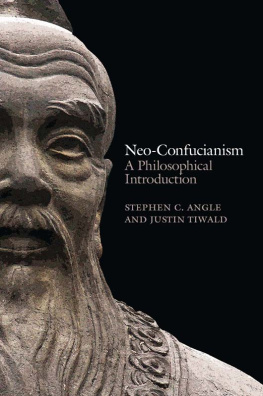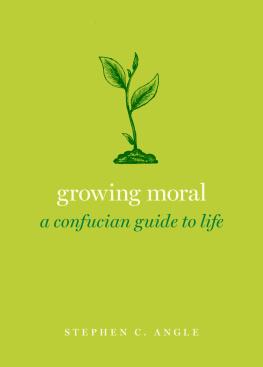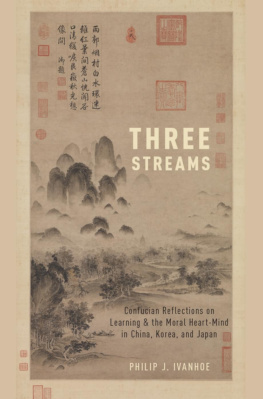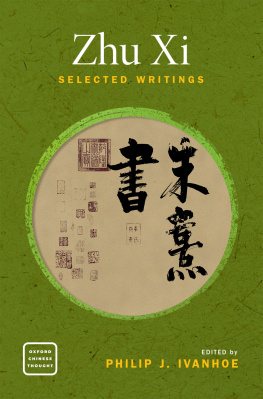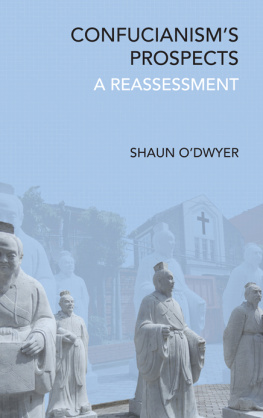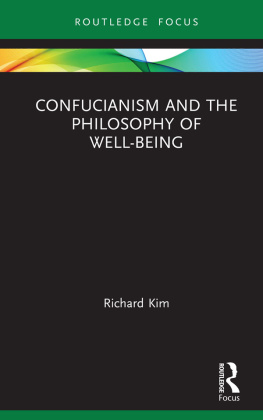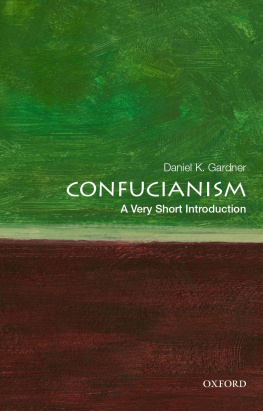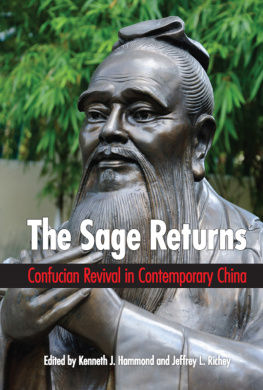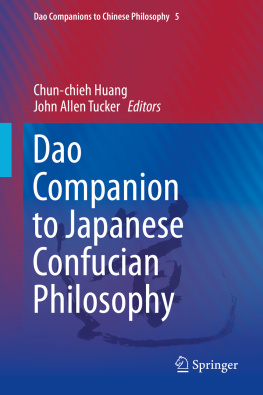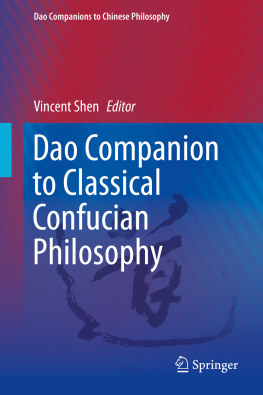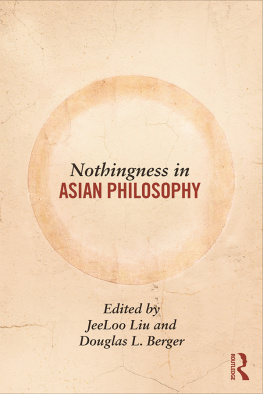
Dedication
We dedicate this book to our families
Copyright page
Copyright Stephen C. Angle and Justin Tiwald 2017
The right of Stephen C. Angle and Justin Tiwald to be identified as Authors of this Work has been asserted in accordance with the UK Copyright, Designs and Patents Act 1988.
First published in 2017 by Polity Press
Polity Press
65 Bridge Street
Cambridge CB2 1UR, UK
Polity Press
350 Main Street
Malden, MA 02148, USA
All rights reserved. Except for the quotation of short passages for the purpose of criticism and review, no part of this publication may be reproduced, stored in a retrieval system, or transmitted, in any form or by any means, electronic, mechanical, photocopying, recording or otherwise, without the prior permission of the publisher.
ISBN-13: 978-0-7456-6248-0
ISBN-13: 978-0-7456-6249-7(pb)
A catalogue record for this book is available from the British Library.
Library of Congress Cataloging-in-Publication Data
Names: Angle, Stephen C., 1964- author. | Tiwald, Justin, author.
Title: Neo-Confucianism : a philosophical introduction / Stephen C. Angle, Justin Tiwald.
Description: Malden, MA : Polity, 2017. | Includes bibliographical references and index.
Identifiers: LCCN 2016038448| ISBN 9780745662480 (hardback) | ISBN 9780745662497 (pbk.)
Subjects: LCSH: Neo-Confucianism.
Classification: LCC B127.N4 A538 2017 | DDC 181/.112dc23 LC record available at https://lccn.loc.gov/2016038448
Typeset in 10.5 on 12 pt Sabon by Toppan Best-set Premedia Limited
Printed and bound in the UK by CPI Group (UK) Ltd, Croydon
The publisher has used its best endeavours to ensure that the URLs for external websites referred to in this book are correct and active at the time of going to press. However, the publisher has no responsibility for the websites and can make no guarantee that a site will remain live or that the content is or will remain appropriate.
Every effort has been made to trace all copyright holders, but if any have been inadvertently overlooked the publisher will be pleased to include any necessary credits in any subsequent reprint or edition.
For further information on Polity, visit our website:
politybooks.com
Preface
The first ideas that there should be a book like this came gradually to the two of us as we each, independently, began our studies of Neo-Confucianism. Carsun Chang's two-volume The Development of Neo-Confucian Thought, published in the late 1950s, was still valuable but long out of date. Much of the best scholarship published in the decades since then focused on intellectual biography or the history of ideas, which we found useful but not entirely satisfactory. We were confident that Neo-Confucian ideas had the depth and sophistication to be engaged with as philosophy, but with the exception of our teachers, Donald J. Munro and Philip J. Ivanhoe few philosophers were paying attention to Neo-Confucianism.
A second stage in the book's emergence occurred in 2011, when Tiwald wrote a review of Angle's book Sagehood: The Contemporary Significance of Neo-Confucian Philosophy. Tiwald was enthusiastic but also critical, and the journal's editor asked Angle to write a reply, and subsequently invited Tiwald to write a follow-up response. Happily, this exchange resulted not in pointless sparring but in what we felt was a genuine process of mutual learning. We valued one another's perspectives and came to see that, with further conversation, we might be able to arrive at that rarest of treasures within philosophy: agreement.
When Polity's Emma Hutchinson proposed to Angle that he write an introductory book on Neo-Confucianism, therefore, he immediately thought of Tiwald and proposed that we write the book together. The conversations and debates that have ensued surpassed either of our expectations. This book is a joint product, written over a period of five years. Evernote has allowed us to share many hundreds of notes and text snippets, on the basis of which and with the help of Dropbox we drafted and redrafted the chapters of this book.
Early on we decided that in order to most effectively highlight the philosophical questions and debates of Neo-Confucianism, we would organize the book topically instead of chronologically a choice that we discuss in both the introduction and in the appendix on using the book in the classroom. Over the course of the writing process, we also developed several conventions to help us organize the massive amount of information that we synthesize here. Original texts from the Neo-Confucian era and before are available in many editions. We reference these texts in our notes with acronyms (for example, YL for Z hu Xi's Yulei) which are all listed and explained in the appendix listing abbreviations of primary sources. Modern editions themselves, as well as modern secondary scholarship, we reference using the author-date system. We take responsibility for all translations, but have consulted existing translations whenever possible, and the notes use cf. to refer readers to these other translations.
In our efforts to recapture the historical thinkers featured in this book we have incurred debts to many of our contemporaries. To begin with, we owe a special debt to our teachers and mentors in Neo-Confucianism, Donald J. Munro and Philip J. Ivanhoe.
We have also presented portions of this book at forums far and wide and benefited from feedback of many audiences. These include the participants in the Buddhist Roots of Neo-Confucianism group, who were John Makeham, John Jorgensen, Dan Lusthaus, and Brook Ziporyn. We thank the scholars at Academia Sinica for their valuable insights, as well as participants in two workshops at the Center for East Asian and Comparative Philosophy, City University of Hong Kong. The book has also benefited from feedback given by audiences at Seoul National University, the Third Annual Northeast Conference on Chinese Thought at Connecticut State University, the Connecticut Philosophy Reading Group, the London School of Economics, the Harvard International Interdisciplinary Conference on Middle Period China, Chengchi University in Taiwan, the International Conference on Mind and Nature in Chinese Philosophy at Tunghai University in Taiwan, Columbia University, the International Conference on Nature and Value in Chinese and Western Philosophy at Rutgers University, and audiences at the 2016 meeting of the Pacific Division of the American Philosophical Association. Among the many generous participants in these events were Ari Borrell, L ee Ming-huei , Fabien Heubel, K im Youngmin, Katalin Balog, Eirik Harris, K im Sungmoon, Leah Zuo, Weimin S un , S hen Hsiang-min , and Mathew Foust. We are particularly grateful for feedback on an early iteration of the complete manuscript from David Wong, Bryan Van Norden, JeeLoo L iu , Brook Ziporyn, Kai Marchal, and P eng Guoxiang .
We wish to express our thanks to the Australian Research Council for funding that has, in part, supported aspects of the research underpinning this publication. Research funding from Wesleyan University was also instrumental in allowing us to meet face to face on several occasions. We have also benefited enormously from the electronic textual resources maintained by the Hong Kong Society of Humanities and by Ctext.org.
We also thank the students who joined the classes in which we presented drafts of these chapters in progress, especially including Jennifer Kanyuk, Brett Rysula, and Lisa Wilcut at SFSU, and Holt Akers-Campbell, Dylan Awalt-Conley, and Rachel Savage at Wesleyan. We are indebted to Maxwell Fong, our talented research assistant, for helping with citations and his many other contributions.
Next page
